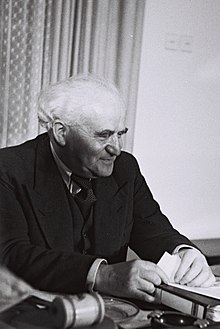
Back David Ben-Gurion Afrikaans David Ben-Gurion ALS David Ben-Gurion AN دافيد بن غوريون Arabic دافيد بن جوريون ARZ David Ben-Gurión AST David Ben-Qurion Azerbaijani داوید بن قوریون AZB Давид Бен-Гурион Bashkir David Ben-Gurion BAT-SMG
David Ben-Gurion דָּוִד בֶּן-גּוּרִיּוֹן | |
|---|---|
 Ben-Gurion pada 19 Januari 1949 (umur 62) | |
| Perdana Menteri Israel | |
| Masa jabatan 17 Mei 1948 – 26 Januari 1954 | |
| Presiden | Chaim Weizmann Yitzhak Ben-Zvi |
| Masa jabatan 3 November 1955 – 26 Juni 1963 | |
| Presiden | Yitzhak Ben-Zvi Zalman Shazar |
| Ketua Dewan Negara Sementara Israel | |
| Masa jabatan 14 Mei 1948 – 16 Mei 1948 | |
| Menteri Pertahanan | |
| Masa jabatan 14 Mei 1948 – 26 Januari 1954 | |
| Perdana Menteri | Sendiri |
Pendahulu Kantor Baru Pengganti Pinhas Lavon | |
| Masa jabatan 21 Februari 1955 – 26 Juni 1963 | |
| Perdana Menteri | Moshe Sharett Sendiri |
| Informasi pribadi | |
| Lahir | David Grün 16 Oktober 1886 Płońsk, Konggres Polandia |
| Meninggal | 1 Desember 1973 (umur 87) Tel HaShomer, Israel |
| Partai politik | Mapai, Rafi, Daftar Nasional |
| Suami/istri | Paula Ben-Gurion |
| Anak | 3 |
| Tanda tangan | |
| Penghargaan
| |
David Ben-Gurion (/bɛn ˈɡʊəriən/ ben-_-goor-EE-ən; bahasa Ibrani: דָּוִד בֶּן־גּוּרִיּוֹן [daˈvid ben ɡuʁˈjon] ⓘ; lahir dengan nama David Grün; 16 Oktober 1886 – 1 Desember 1973) adalah Perdana Menteri Israel pertama. Gairah Ben-Gurion untuk Zionisme, yang dimulai sejak awal kehidupan, membawanya menjadi seorang pemimpin Zionis besar, dan sebagai kepala Badan Yahudi, ia menjadi de facto pemimpin komunitas Yahudi di Palestina, dan sebagian besar memimpin perjuangan untuk kemerdekaan negara Yahudi di Palestina. Pada tahun 1948, ia secara resmi menyatakan pendirian Negara Israel, dan dialah yang pertama menandatangani Deklarasi Kemerdekaan Israel. Ben-Gurion memimpin pemerintah sementara Israel selama Perang Arab-Israel 1948, dan menyatukan berbagai milisi Yahudi ke dalam Angkatan Pertahanan Israel (IDF). Setelah perang, Ben-Gurion pertama menjabat sebagai Perdana Menteri Israel. Sebagai Perdana Menteri, ia membantu membangun lembaga-lembaga negara, memimpin berbagai proyek nasional yang ditujukan untuk pembangunan negara. Dia juga mengawasi penyerapan sejumlah besar orang Yahudi dari seluruh dunia. Pada tahun 1953, ia mengundurkan diri dan menjabat sebagai Menteri Pertahanan, sebelum kembali menempati posisi itu pada tahun 1955. Di bawah kepemimpinannya, Israel menanggapi agresif terhadap serangan gerilya Arab, dan pada tahun 1956, menyerbu Mesir bersama dengan pasukan Inggris dan Prancis setelah Mesir menasionalisasi Terusan Suez. Ia mengundurkan diri dari jabatannya pada tahun 1963, dan pensiun dari kehidupan politik pada tahun 1970. Dia kemudian pindah ke Sde Boker, sebuah kibbutz di gurun Negev, di mana dia tinggal sampai kematiannya. Anumerta, Ben-Gurion sebagai salah satu dari 100 Orang Paling Penting dari abad ke-20 versi majalah Time.
- ^ Zev Chafets (2008). A Match Made in Heaven: American Jews, Christian Zionists, and One Man's Exploration of the Weird and Wonderful Judeo-Evangelical Alliance. HarperCollins. hlm. 37. ISBN 9780060890599. Diakses tanggal 12 September 2012.
“To be a realist here, you have to believe in miracles,” David Ben-Gurion once remarked. He didn't believe that literally, of course; he was an atheist. But he insisted that his offi- cials and generals take Old Testament names.
- ^ Tariq Ali (2003). The Clash of Fundamentalisms: Crusades, Jihads and Modernity (edisi ke-2). Verso. hlm. 10. ISBN 9781859844571. Diakses tanggal 12 September 2012.
Ben-Gurion and Moshe Dayan were self-proclaimed atheists.
- ^ Giulio Meotti (2011). A New Shoah: The Untold Story of Israel's Victims of Terrorism. ReadHowYouWant.com. hlm. 147. ISBN 9781459617414.
Even atheist and socialist Israelis like David Ben-Gurion, Moshe Dayan, and Golda Meir were marked by the stories and legends of King David and the prophets. In other words, their lives had been shaped by Hebron.
- ^ Karen Armstrong (1997). Jerusalem: One City, Three Faiths. Random House Digital, Inc. hlm. 369. ISBN 9780345391681.
Even a committed atheist like Ben-Gurion found its sacred position on his own emotional map more compelling than the demographic and historical facts that were staring him in the face.
- ^ Jonathan B. Isacoff (2006). "2". Writing the Arab-Israeli Conflict: Pragmatism And Historical Inquiry. Lexington Books. hlm. 54. ISBN 9780739112731. Diakses tanggal 19 September 2012.
David Ben-Gurion makes an especially fascinating study as a spokesman for Jewish messianic teleology in that by most accounts he was a secular atheist.
- ^ Eyal Chowers (2012). The Political Philosophy of Zionism: Trading Jewish Words for a Hebraic Land. Cambridge University Press. hlm. 124. ISBN 9781107005945.
David Ben-Gurion (1886–1973), the first prime minister of Israel and its foremost politician in the age...Though an atheist, he saw the Bible as the most important source for shaping the new Hebrew's identity...
- ^ Israel Shahak (1994). Jewish History, Jewish Religion: The Weight of Three Thousand Years. Pluto Press. hlm. 8. ISBN 9780745308197. Diakses tanggal 19 September 2012.
In 1956 I eagerly swallowed all of Ben-Gurion's political and military reasons for Israel initiating the Suez War, until he (in spite of being an atheist, proud of his disregard of the commandments of Jewish religion) pronounced in the Knesset on the third day of that war, that the real reason for it is 'the restoration of the kingdom of David and Solomon' to its Biblical borders.



